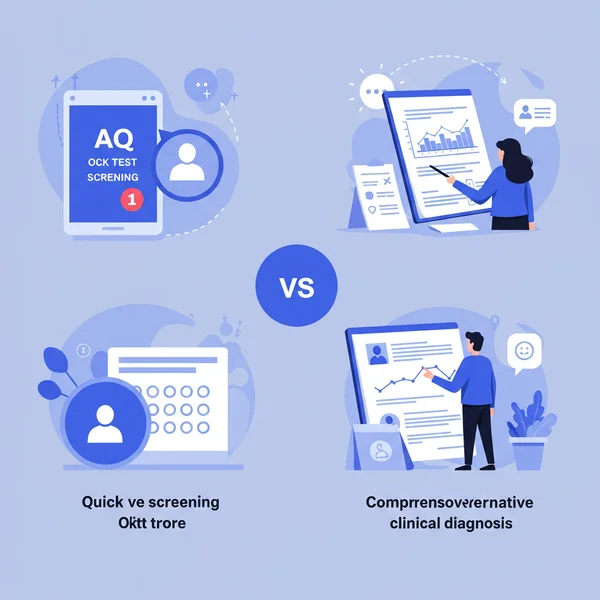AQ Test vs. Diagnosis: Understanding Key Differences
August 4, 2025 | By Eliza Finch
Have you recently taken an AQ test and are now pondering what your score truly means for you? Or perhaps you're considering one as a tool for self-discovery. Many of us find ourselves on a similar journey, eager to navigate the intricacies of our own minds and gain a deeper understanding. Is the AQ test a diagnosis for autism? This is a critical question, and the answer is a clear and simple: no. This article will illuminate the crucial distinction between a self-administered Autism Spectrum Quotient (AQ) test and a formal clinical autism diagnosis.
Understanding the difference is essential. It empowers you to use tools like the AQ test responsibly and helps you recognize when seeking a professional evaluation might be the right next step. For those beginning their journey, an online autism test can be a valuable, private starting point. Let’s explore what each process involves, what it can tell you, and how they fit into the broader picture of understanding neurodiversity.
Understanding the AQ Test: A Screening Tool
The AQ test is best understood as a preliminary screening instrument. Developed by Professor Simon Baron-Cohen and his team at the University of Cambridge, it's a 50-question survey designed to measure the extent of autistic traits in adults. It doesn't deliver a definitive verdict; rather, it aims to provide a score that can serve as an indicator, sparking further self-reflection or a conversation with a professional.
Think of it like a weather forecast. The forecast can tell you if there's a high probability of rain, but it can't tell you with absolute certainty if your specific street will get wet. Similarly, the AQ test indicates the presence of traits associated with the autism spectrum. Our platform provides a free, immediate AQ score and offers a unique, AI-powered report for deeper insights into what those traits mean for you.

What the AQ Test Measures
The AQ test measures traits across five core areas where autistic and non-autistic people often experience the world differently. Specifically, the test explores five key areas where individuals on the autism spectrum often experience the world differently, including:
- Social Skills: Your comfort and proficiency in social interactions.
- Communication: How you use and interpret verbal and non-verbal language.
- Imagination: This assesses your imaginative abilities, including pretend play and storytelling.
- Attention to Detail: Your focus on patterns, systems, and small details.
- Attention Switching/Tolerance of Change: How you cope with interruptions and transitions from one task to another.
By quantifying your responses in these areas, the test generates an overall AQ score. This score helps map your personal profile against common autistic characteristics, offering a glimpse into your unique cognitive style.
Limitations of an Online Autism Screening
While a valuable tool, an online autism screening has inherent limitations. It is a self-report questionnaire, meaning its accuracy depends on your self-awareness and honesty. It cannot capture the nuance and complexity of a person’s lived experience in the way a human clinician can.
Crucially, an online test does not consider other factors that a professional would. This includes your developmental history, the presence of co-occurring conditions like ADHD or anxiety, and direct behavioral observations. A score is just a number; it lacks the context and comprehensive understanding that a clinical evaluation provides. It's a signpost, not a destination.
What is a Clinical Autism Assessment?
A clinical autism assessment is a comprehensive diagnostic evaluation conducted by qualified healthcare professionals. Unlike a brief online questionnaire, this process is thorough, multi-faceted, and designed to provide a definitive diagnostic conclusion. It aims to create a holistic picture of an individual's strengths, challenges, and support needs.
This formal process goes far beyond a simple score. It involves in-depth analysis and expert judgment to determine if an individual meets the established criteria for Autism Spectrum Disorder (ASD) as outlined in diagnostic manuals like the DSM-5. This is the only pathway to a formal, recognized diagnosis.

The Formal Diagnostic Process Explained
The formal diagnostic process for autism is not standardized in a single test but involves several components. It is tailored to the individual and typically includes:
- Detailed Interviews: Clinicians will conduct in-depth interviews with you about your developmental history, from early childhood to the present day. They may also ask to speak with a parent or partner to gain a broader perspective.
- Behavioral Observations: The clinician will observe your communication style, social interactions, and non-verbal cues during the assessment sessions.
- Standardized Diagnostic Tools: Professionals use validated instruments like the ADOS-2 (Autism Diagnostic Observation Schedule) or the ADI-R (Autism Diagnostic Interview-Revised), which are considered the gold standard for diagnosis.
- Evaluation of Co-occurring Conditions: The assessment will also screen for other conditions that can co-occur with or present similarly to autism, ensuring an accurate and comprehensive understanding.
Who Can Diagnose Autism Spectrum Disorder?
It is vital to understand that only specific licensed professionals can diagnose Autism Spectrum Disorder. These experts have specialized training in neurodevelopmental conditions. They include:
- Clinical Psychologists
- Psychiatrists
- Neurologists
- Developmental Pediatricians
A general practitioner or therapist can be a great first point of contact, but for a formal diagnosis, they will refer you to one of these specialists.
AQ Test vs. Clinical Diagnosis: Key Distinctions
The core difference between an autism screening vs diagnosis lies in their purpose, depth, and outcome. One is a starting point for curiosity, while the other is a destination for clarity. Recognizing this distinction is key to using each tool appropriately on your journey.

Purpose and Outcomes
The purpose and outcomes of each are vastly different.
- AQ Test: Its purpose is self-exploration and screening. The outcome is an AQ score that indicates the level of autistic traits. On our platform, you can also receive a detailed AI-powered report that explains your personal strengths and challenges, serving as a guide for self-understanding.
- Clinical Diagnosis: Its purpose is to provide a formal, medical determination. The outcome is a comprehensive diagnostic report that can be used to access support services, therapies, and workplace or academic accommodations.
Depth and Scope of Evaluation
The scope of evaluation is another major point of difference. The AQ test is a snapshot—a 50-question, self-administered survey that takes about 15 minutes. It offers a single, focused perspective based on your own input.
A clinical assessment is a feature film. It's a multi-hour (often multi-session) process involving direct observation, historical review, and multiple validated tools administered by a trained expert. It provides a deep, contextualized, and authoritative understanding of your neurotype.
When to Seek Professional Autism Help
After taking an AQ test, you might wonder about the next steps. A high score doesn't automatically mean you should seek a diagnosis, and a low score doesn't invalidate your experiences. The decision to seek professional autism help is deeply personal.
Signs It's Time for a Formal Evaluation
Consider a formal evaluation if:
- Your autistic traits are significantly impacting your daily life, including your work, relationships, or mental health.
- You are seeking formal accommodations at school or in the workplace.
- You feel that a definitive answer would provide you with peace of mind and a stronger sense of identity.
- A healthcare professional has recommended an assessment based on your shared concerns.
Preparing for a Clinical Assessment
If you decide to pursue a diagnosis, preparing for a clinical assessment can make the process smoother. Bringing your AQ test results can be a helpful starting point for the conversation. You can also:
-
Write down specific examples from your life that align with the traits you're describing.
-
Gather any relevant childhood records or memories.
-
Bring a list of questions you have for the clinician.
-
Our free AQ test and optional AI report can serve as a structured document to help you organize your thoughts and present your experiences clearly to a professional.

Your Journey to Understanding Neurodiversity
Your unique journey into understanding neurodiversity is profoundly personal. While the AQ test offers an accessible, private starting point for self-exploration and initial insights, a clinical diagnosis provides a comprehensive, professional path to clarity, validation, and necessary support. Both serve distinct yet invaluable roles in empowering you with self-knowledge. Embrace this path—it's about understanding and valuing your unique cognitive style.
Ready to take the first step in understanding your unique traits? Take our free AQ test today and see what insights you can uncover about your personal cognitive style. We'd love to hear about your experiences or questions in the comments below.
Frequently Asked Questions About AQ Test & Diagnosis
Is the AQ test a diagnosis for autism?
No, it is not. The AQ test is a screening tool designed to measure autistic traits. It can be a helpful resource for self-reflection, but it cannot replace a comprehensive evaluation performed by a qualified healthcare professional, which is required for a formal diagnosis.
What is the difference between the AQ test and a clinical diagnosis?
The main difference lies in their purpose and depth. The AQ test is a brief, self-report questionnaire that provides a score indicating the level of autistic traits. A clinical diagnosis is a thorough, multi-faceted assessment conducted by an expert that results in a formal report and can provide access to support services.
What does a high AQ test score mean?
A high score on the AQ test suggests that you have a significant number of traits commonly associated with the autism spectrum. It is an indicator that may warrant further self-exploration or a conversation with a professional. It is not, by itself, a confirmation of autism. The meaning of your score can be further explored with tools like our optional AI-powered report.
What should I do after getting my AQ score?
After receiving your score, take time to reflect on it. Consider how the results align with your personal experiences. If you have questions or concerns, or if your traits are impacting your daily life, you might consider discussing your results with a trusted friend, family member, or a mental health professional.